#climate action
Text
"Clothing tags, travel cards, hotel room key cards, parcel labels … a whole host of components in supply chains of everything from cars to clothes. What do they have in common? RFID tags.
Every RFID (Radio Frequency Identification) tag contains a microchip and a tiny metal strip of an antenna. A cool 18bn of these are made – and disposed of – each year. And with demands for product traceability increasing, ironically in part because of concerns for the social and environmental health of the supply chain, that’s set to soar.
And guess where most of these tags end up? Yup, landfill – adding to the burgeoning volumes of e-waste polluting our soils, rivers and skies. It’s a sorry tale, but it’s one in which two young graduates of Imperial College London and Royal College of Art are putting a great big green twist. Under the name of PulpaTronics, Chloe So and Barna Soma Biro reckon they’ve hit on a beguilingly simple sounding solution: make the tags out of paper. No plastic, no chips, no metal strips. Just paper, pure and … simple … ? Well, not quite, as we shall see.
The apparent simplicity is achieved by some pretty cutting-edge technical innovation, aimed at stripping away both the metal antennae and the chips. If you can get rid of those, as Biro explains, you solve the e-waste problem at a stroke. But getting rid of things isn’t the typical approach to technical solutions, he adds. “I read a paper in Nature that set out how humans have a bias for solving problems through addition – by adding something new, rather than removing complexity, even if that’s the best approach.”
And adding stuff to a world already stuffed, as it were, can create more problems than it solves. “So that became one of the guiding principles of PulpaTronics”, he says: stripping things down “to the bare minimum, where they are still functional, but have as low an environmental impact as possible”.
...how did they achieve this magical simplification? The answer lies in lasers: these turn the paper into a conductive material, Biro explains, printing a pattern on the surface that can be ‘read’ by a scanner, rather like a QR code. It sounds like frontier technology, but it works, and PulpaTronics have patents pending to protect it.
The resulting tag comes in two forms: in one, there is still a microchip, so that it can be read by existing scanners of the sort common within retailers, for example. The more advanced version does away with the chip altogether. This will need a different kind of scanner, currently in development, which PulpaTronics envisages issuing licences for others to manufacture.
Crucially, the cost of both versions is significantly cheaper than existing RFID kit – making this a highly viable proposition. Then there are the carbon savings: up to 70% for the chipless version – so a no-brainer from a sustainability viewpoint too. All the same, industry interest was slow to start with but when PulpaTronics won a coveted Dezeen magazine award in late 2023, it snowballed, says So. Big brands such as UPS, DHL, Marks & Spencer and Decathlon came calling. “We were just bombarded.” Brands were fascinated by the innovation, she says, but even more by the price point, “because, like any business, they knew that green products can’t come with a premium”."
-via Positive.News, April 29, 2024
--
Note: I know it's still in the very early stages, but this is such a relief to see in the context of the environmental and human rights catastrophes associated with lithium mining and mining for rare earth metals, and the way that EVs and other green infrastructure are massively increasing the demand for those materials.
I'll take a future with paper-based, more humane alternatives for sure! Fingers crossed this keeps developing and develops well (and quickly).
#I do really wish it could be read by regular scanners already though#that's what I thought at first#and that would've been fucking amazing#but this is still pretty cool#electronics#science and technology#green technology#ewaste#landfill#lithium#lithium mining#human rights#environment#climate action#climate hope#rfid#rfid technology#rfid tags#good news#hope
247 notes
·
View notes
Text
Things Biden and the Democrats did, this week #17
May 3-10 2024
Vice President Harris announced 5.5 billion dollars to build affordable housing and address homelessness. The grants will go to 1,200 communities across all 50 states, DC and Puerto Rico. 1.3 billion will go to HUD's HOME program which builds, buys, and rehabs affordable housing for rent or ownership. 3.3 billion is headed to Community Development Block Grants which supports housing as well as homeless services, and expanding economic opportunities. Remaining funds focus on building housing for extremely low- and very low-income households, Housing for people struggling with HIV/AIDS, transitional housing for those with substance-use disorder, and money to support homeless shelters and homeless prevention programs.
At the 3rd meeting of the Los Angeles Declaration group in Guatemala Security of State Blinken announced $578 million in new US aid to Latin America. The Los Angeles Declaration is a partnership between the US and 20 other nations in the Americas to address immigration, combat human trafficking, and support economic development and improved quality of life for people in poor nations in the Americas. The bulk of the aid, over $400 million will go to humanitarian assistance to the Venezuelan people. Inside of Venezuela over 7 million people are in need of humanitarian assistance due to decades of political and economic instability. Over 7 million more have been forced to flee the country and live in poverty across the Americas. The aid will help Venezuelans both inside and outside of Venezuela.
The Department of Energy lead an effort to get the G7 to agree to phase out coal by the early 2030s. The G7 is a collection of the 7 largest Industrial economies on Earth, the US, the UK, Canada, France, Germany, Japan, and Italy. To avoid catastrophic climate change the International Energy Agency believes coal needs to be phased out by 2035. However this has been a sticking point with the G7 since 1/3rd of Japan and 1/4th of Germany's energy comes from Coal. This agreement to phase out represents a major breakthrough and the US plans to press for even wider agreement on the issue at the G20 meeting in November.
President Biden announced a major investment deal in Racine, Wisconsin, site of the failed Trump Foxconn deal. In 2018 then President Trump visited Racine and declared the planned Foxconn plant "the eighth wonder of the world.". However the promised 13,000 jobs never materialized and the Taiwan based Foxconn after bulldozing 100s of homes and farms decided not to build. President Biden inked a deal with Microsoft for the land formally given to Foxconn which will bring 2,000 new jobs to Racine to help replace the 1,000 job losses during Trump's Presidency in the community.
200 tribal governments and the US territories of American Samoa, the Northern Mariana Islands, Guam, and the U.S. Virgin Islands, published climate action plans. The plans were paid for by the Biden Administration as part of a 5 billion dollar Climate Pollution Reduction Grants program. The federal government is supporting all 50 states, territories, DC, and tribal governments to draft climate action plans, which will be used to apply for more than 4 billion dollars in grants to help turn plans into reality
As part of marking Yom HaShoah (Holocaust Remembrance Day), the Biden Administration announced a number of action aimed at combating antisemitism and supporting the Jewish Community. This included $400 million in new funding for the Nonprofit Security Grant Program. The Program has supported Synagogues and Jewish Community Centers with security improvements like bullet proof windows and trainings for staff in how to handle active shooter and hostage situations. The Department of Education issued guidance to all schools districts and federally funded colleges stressing that antisemitism is banned under Title VI of the Civil Rights Act of 1964. These actions come as part of the Biden Administration's National Strategy To Counter Antisemitism, the first ever national strategy addressing the issue by any Administration.
USAID announced $220 million in additional humanitarian aid to Yemen. This new funding will bring US aid to Yemen over the last 10 years to nearly $6 billion. Currently 18 million Yemenis are estimated as needing humanitarian assistance, 9 million of them children, and the UN believes nearly 14 million face imminent risk of famine. The US remains the single largest donor nation to humanitarian relief in Yemen.
The Department of Interior announced nearly $150 million to help communities fight drought. The funds will support 42 projects across 10 western states. This is part of the President's $8.3 billion dollar investment in the nations water infrastructure over the next 5 five years.
#Thanks Biden#Joe Biden#climate change#climate action#coal power#affordable homes#immigration#venezuela#Yemen#antisemitism#politics#us politics#Democrats#2024 elections#economy
152 notes
·
View notes
Text

climate justice isn't something you EVER get to water down or view one-dimensionally.
#social justice#climate justice#climate action#climate crisis#climate change#climate catastrophe#environment#greta thunberg#anti imperialism#fuck colonialism#colonial violence#free palestine
50 notes
·
View notes
Text
everyone please read this and share if you can.
Brazil is going through one of the worst climatic crisis ever seen.
i live in the southernmost state, Rio Grande do Sul. we have been suffering from extreme, nonstop rainstorms for a week now. the rivers are flooding, reaching 4-6 meters above their natural level. people are being rescued by helicopters, neighborhoods are being evacuated. entire cities are slowly but surely becoming submerged in water. 60 people missing and counting. 32 deaths and counting.
and this is not new. last november also had a flood like this one. 50 dead, many material losses. it happened again this january, with thousands being left without power or water for days.
three catastrophical disasters within less than a year. three disasters only a few months apart.
this is not natural.
unsustainable agricultural practices and politics led to this. a complete disregard for nature led to this. greed led to this. always greed.
when it comes to the climate crisis, i cannot stress this enough: we need to act now if we still want to live. disasters like this are going to happen more often and they're going to be much, much worse. this flood is being considered the worst climatic catastrophe in the history of my state. i don't know how long it will take for another bigger one to happen and take its place. i just know it will be sooner than it should.
links to donate (if you can't donate, sharing already helps a lot):
link for non-brazilians (paybox)
link for brazilians
pix assufrgs
updated links are on the pinned post on my blog. in the meantime, pray for us.
#UPDATED LINKS ON THE PINNED POST ON MY BLOG#please share if you can#rio grande do sul#brasil#brazil#climate emergency#climate catastrophe#climate crisis#climate change#climate action
27K notes
·
View notes
Text
youtube
Watch the 2024 American Climate Leadership Awards for High School Students now: https://youtu.be/5C-bb9PoRLc
The recording is now available on ecoAmerica's YouTube channel for viewers to be inspired by student climate leaders! Join Aishah-Nyeta Brown & Jerome Foster II and be inspired by student climate leaders as we recognize the High School Student finalists. Watch now to find out which student received the $25,000 grand prize and top recognition!
#ACLA24#ACLA24HighSchoolStudents#youtube#youtube video#climate leaders#climate solutions#climate action#climate and environment#climate#climate change#climate and health#climate blog#climate justice#climate news#weather and climate#environmental news#environment#environmental awareness#environment and health#environmental#environmental issues#environmental education#environmental justice#environmental protection#environmental health#high school students#high school#youth#youth of america#school
12K notes
·
View notes
Text

DR ADAM LEVY ClimateAdam
ROSEMARY MOSCO
#comic#climate change#climate science#climate action#climate crisis#doom scroll break#radical optimism#hope is a radical act
27K notes
·
View notes
Text
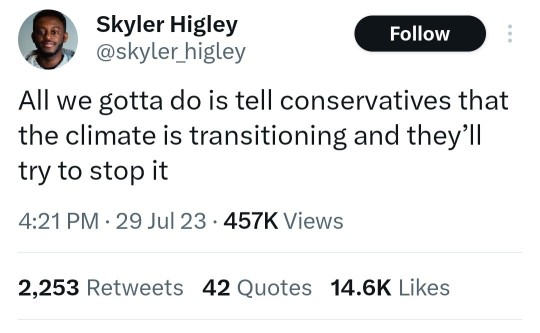
#lgbtq community#lgbtqia#lgbt pride#lgbtq#nonbinary#lesbian#queer#sapphic#nonbinary lesbian#gay girls#transition#trans women#trans#transgender#hrt#transitioning#climate change#climate emergency#climate action#environment#global warming#climate crisis#climate and environment#environmentalism
14K notes
·
View notes
Text
hey uh so I haven't seen anyone talking about this here yet, but
the amazon river, like the biggest river in the fucking world, in the middle of the amazon fucking rainforest, is currently going through its worst drought since the records began 121 years ago
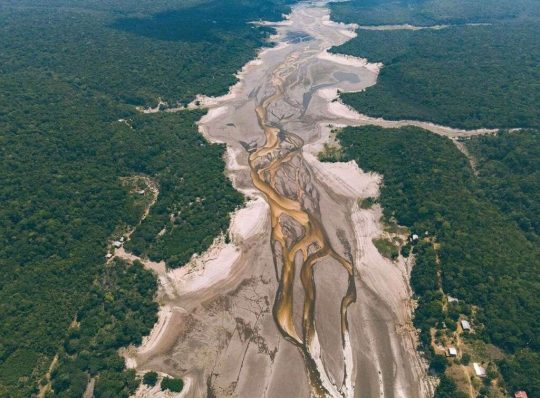
picture from Folha PE
there's a lot going on but I haven't seen much international buzz around this like there was when the forest was on fire (maybe because it's harder to shift the narrative to blame brazil exclusively as if the rest of the world didn't have fault in this) so I wanted to bring this to tumblr's attention
I don't know too many details as I live in the other side of the country and we are suffering from the exact opposite (at least three cyclones this year, honestly have stopped counting - it's unusual for us to get hit by even one - floods, landslides, we have a death toll, people are losing everything to the water), but like, I as a brazilian have literally never seen pictures of the river like this before. every single city in the amazonas state is in a state of emergency as of november 1st.
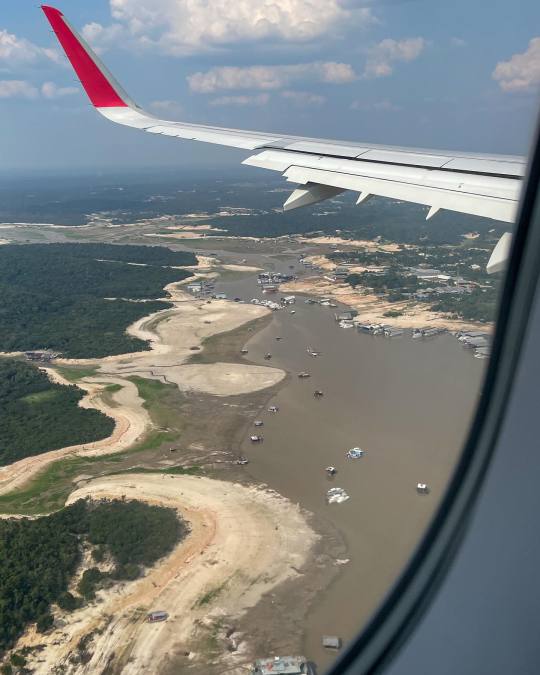
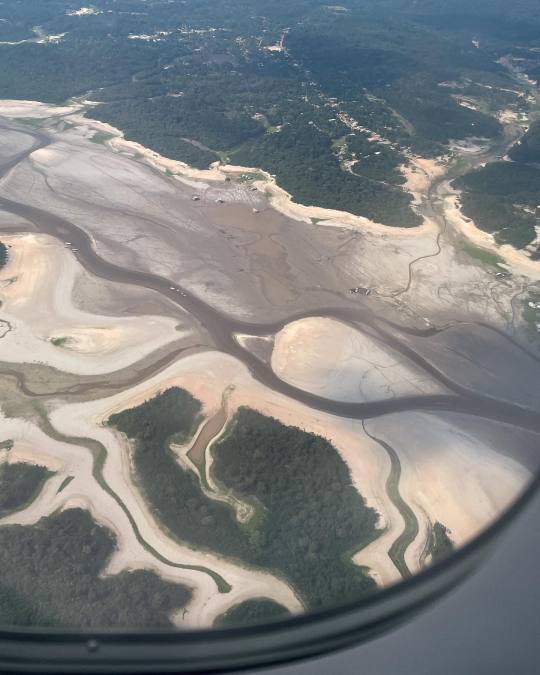
pictures by Adriano Liziero (ig: geopanoramas)
we are used to seeing images of rio negro and solimões, the two main amazon river affluents, in all their grandiose and beauty and seeing these pictures is really fucking chilling. some of our news outlets are saying the solimões has turned to a sand desert... can you imagine this watery sight turning into a desert in the span of a year?
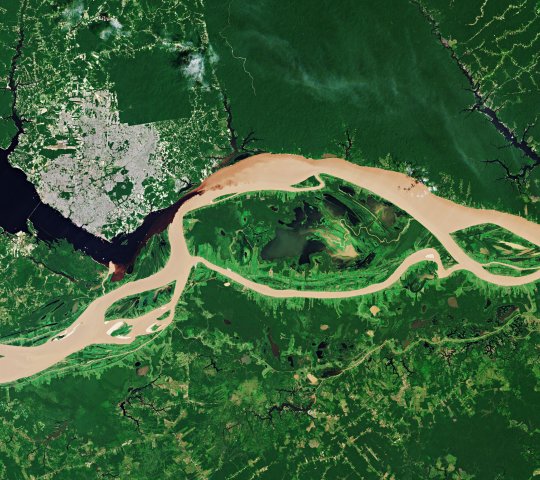
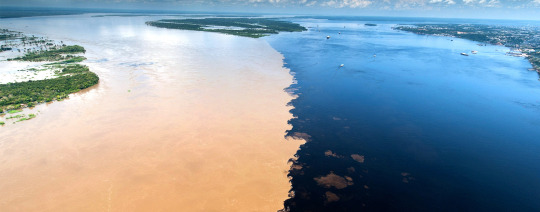
while down south we are seeing amounts of rain and hailstorms the likes of which our infrastructure is simply not built to deal with, up north people who have built everything around the river are at a loss of what to do.
the houses there that are built to float are just on the ground, people who depend on fishing for a living have to walk kilometers to find any fish that are still alive at all, the biodiversity there is at risk, and on an economic level it's hard to grasp how people from the northern states are getting by at all - the main means of transport for ANYTHING in that region is via the river water. this will impact the region for months to come. it doesnt make a lot of sense to build a lot of roads bc it's just better to use the waterway system, everything is built around or floats on the river after all. and like, the water level is so incomprehensibly low the boats are just STUCK. people are having a hard time getting from one place to another - keep in mind the widest parts of the river are over 10 km apart!!
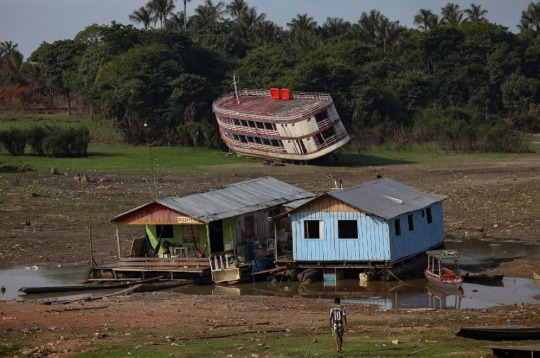
this shit is really serious and i am trying not to think about it because we have a different kind of problem to worry about down south but it's really terrifying when I stop to think about it. you already know the climate crisis is real and the effects are beyond preventable now (we're past global warming, get used to calling it "global boiling"). we'll be switching strategies to damage control from now on and like, this is what it's come to.
I don't like to be alarmist but it's hard not to be alarmed. I'm sorry that I can't end this post with very clear intructions on how people overseas can help, there really isn't much to do except hope the water level rises soon, maybe pray if you believe in something. in that regard we just have to keep pressing for change at a global level; local conditions only would not, COULD NOT be causing this - the amazon river is a CONTINENTAL body of water, it spans across multiple countries. so my advice is spread the word, let your representatives know that you're worried and you want change towards sustainability, degrowth and reduced carbon emissions, support your local NGOs, maybe join a cause, I don't know? I recommend reading on ecological and feminist economics though
however, I know you can help the affected riverine families by donating to organizations dedicated to helping the region. keep in mind a single US dollar, pound or euro is worth over 5x more in our currency so anything you donate at all will certainly help those affected.
FAS - Sustainable Amazon Fundation
Idesam - Sustainable Developent and Preservation Institute of Amazonas
Greenpeace Brasil - I know Greenpeace isn't the best but they're one of the few options I can think of that have a bridge to the international world and they are helping directly
There are a lot of other smaller/local NGOs but I'm not sure how you could donate to them from overseas, I'll leave some of them here anyway:
Projeto Gari
Caritás Brasileira
If you know any other organizations please link them, I'll be sure to reblog though my reach isn't a lot
thank you so much for reading this to the end, don't feel obligated to share but please do if you can! even if you just read up to here it means a lot to me that someone out there knows
also as an afterthought, I wanted to expand on why I think this hasn't made big news yet: because unlike the case of the 2020 forest fires, other countries have to hold themselves accountable when looking at this situation. while in 2020 it was easier to pretend the fires were all our fault and people were talking about taking the amazon away from us like they wouldn't do much worse. global superpowers have no more forests to speak of so I guess they've been eyeing what latin america still has. so like this bit of the post is just to say if you're thinking of saying anything of the sort, maybe think of what your own country has done to contribute to this instead of blaming brazil exclusively and saying the amazon should be protected by force or whatever
#solarpunk#sustainability#environmentalism#climate change#climate crisis#global warming#amazon rainforest#amazon river#geography#brazil#degrowth#punk#global boiling#ecopunk#anti capitalism#climate action#climate activism#the world does not die on my watch#i saw someone use that tag and uh i like it we should make it a thing#long post#:/ sorry i know no one likes lengthy bad news posts on their dashes but i've been thinking about this quite a bit#and i don't really know what to do to help bc i don't have money to donate and i am 10 thousand km away#i think i could be doing more to help but i am already trying my best#again dont feel obligated to share or read this but it would be nice and i would love you forever#have removed lbv from the post
7K notes
·
View notes
Text


#keir starmer#leftism#socialism#ecosocialism#environment#environmetalists#climate change#climate crisis#climate#climate action#climate disaster#capitalism#anti capitalism#communism#britain
7K notes
·
View notes
Text
this is important. please share
i apologize for my english. i'm (south) brazilian, it's not my first language.
Right now, in south Brazil, most in the state of Rio Grande do Sul, there are many floods happening. really bad ones.
Entire cities are basically underwater. Cities like Lageado, the state capital Porto Alegre, Canoas. Over 30 thousand people are displaced because their homes have been destroyed. Many more families have been affected.
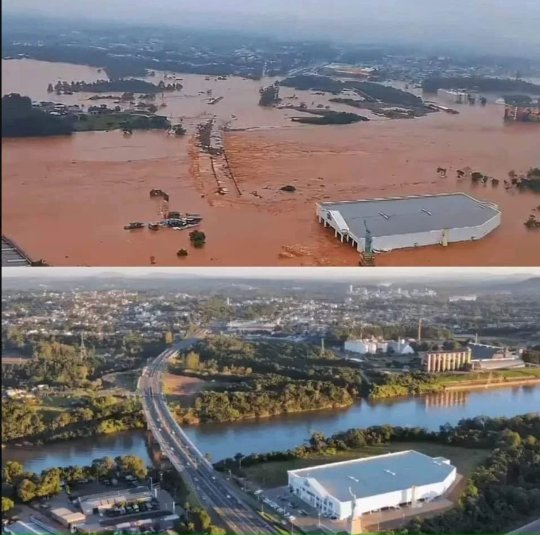
this is the city of Lageado before and after the floods.
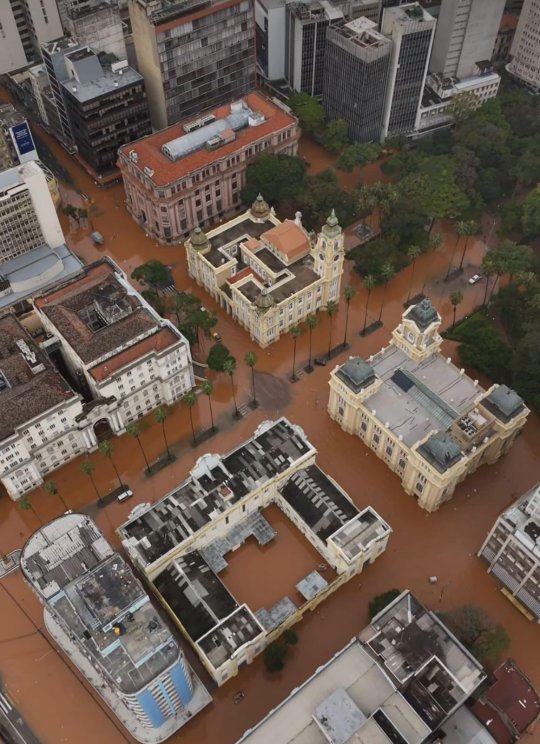
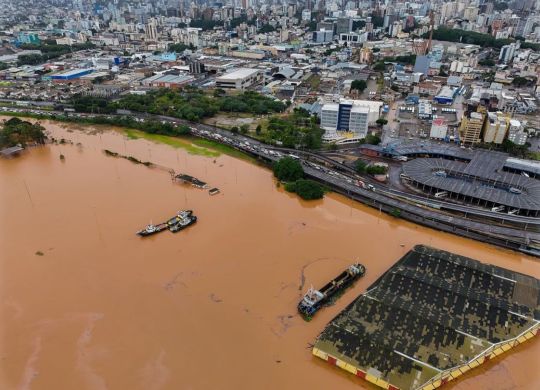
Please donate if you can!
this is the link for international donations, as most of people here are not brazilian.
link pra brasileiros doearem, pode ser por pix (link for brazilians)
if you can't donate, please share!
by the way, similar things happened last year in south brazil. my city had floods. this is a direct result of climate change. please, please bring attention to this.
1K notes
·
View notes
Text

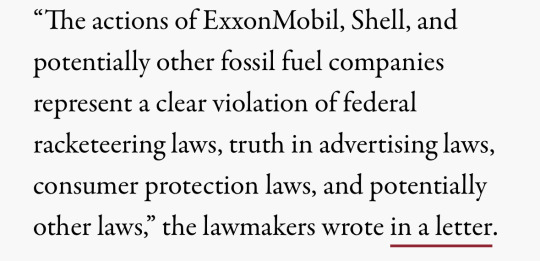
Source
Long overdue
#politics#us politics#government#climate justice#climate action#ban fossil fuels#environmental justice#environmetalists#enviromental#the left#activism#bernie sanders#news#current events
3K notes
·
View notes
Text
No paywall version here.
"Two and a half years ago, when I was asked to help write the most authoritative report on climate change in the United States, I hesitated...
In the end, I said yes, but reluctantly. Frankly, I was sick of admonishing people about how bad things could get. Scientists have raised the alarm over and over again, and still the temperature rises. Extreme events like heat waves, floods and droughts are becoming more severe and frequent, exactly as we predicted they would. We were proved right. It didn’t seem to matter.
Our report, which was released on Tuesday, contains more dire warnings. There are plenty of new reasons for despair. Thanks to recent scientific advances, we can now link climate change to specific extreme weather disasters, and we have a better understanding of how the feedback loops in the climate system can make warming even worse. We can also now more confidently forecast catastrophic outcomes if global emissions continue on their current trajectory.
But to me, the most surprising new finding in the Fifth National Climate Assessment is this: There has been genuine progress, too.
I’m used to mind-boggling numbers, and there are many of them in this report. Human beings have put about 1.6 trillion tons of carbon in the atmosphere since the Industrial Revolution — more than the weight of every living thing on Earth combined. But as we wrote the report, I learned other, even more mind-boggling numbers. In the last decade, the cost of wind energy has declined by 70 percent and solar has declined 90 percent. Renewables now make up 80 percent of new electricity generation capacity. Our country’s greenhouse gas emissions are falling, even as our G.D.P. and population grow.
In the report, we were tasked with projecting future climate change. We showed what the United States would look like if the world warms by 2 degrees Celsius. It wasn’t a pretty picture: more heat waves, more uncomfortably hot nights, more downpours, more droughts. If greenhouse emissions continue to rise, we could reach that point in the next couple of decades. If they fall a little, maybe we can stave it off until the middle of the century. But our findings also offered a glimmer of hope: If emissions fall dramatically, as the report suggested they could, we may never reach 2 degrees Celsius at all.
For the first time in my career, I felt something strange: optimism.
And that simple realization was enough to convince me that releasing yet another climate report was worthwhile.
Something has changed in the United States, and not just the climate. State, local and tribal governments all around the country have begun to take action. Some politicians now actually campaign on climate change, instead of ignoring or lying about it. Congress passed federal climate legislation — something I’d long regarded as impossible — in 2022 as we turned in the first draft.
[Note: She's talking about the Inflation Reduction Act and the Infrastructure Act, which despite the names were the two biggest climate packages passed in US history. And their passage in mid 2022 was a big turning point: that's when, for the first time in decades, a lot of scientists started looking at the numbers - esp the ones that would come from the IRA's funding - and said "Wait, holy shit, we have an actual chance."]
And while the report stresses the urgency of limiting warming to prevent terrible risks, it has a new message, too: We can do this. We now know how to make the dramatic emissions cuts we’d need to limit warming, and it’s very possible to do this in a way that’s sustainable, healthy and fair.
The conversation has moved on, and the role of scientists has changed. We’re not just warning of danger anymore. We’re showing the way to safety.
I was wrong about those previous reports: They did matter, after all. While climate scientists were warning the world of disaster, a small army of scientists, engineers, policymakers and others were getting to work. These first responders have helped move us toward our climate goals. Our warnings did their job.
To limit global warming, we need many more people to get on board... We need to reach those who haven’t yet been moved by our warnings. I’m not talking about the fossil fuel industry here; nor do I particularly care about winning over the small but noisy group of committed climate deniers. But I believe we can reach the many people whose eyes glaze over when they hear yet another dire warning or see another report like the one we just published.
The reason is that now, we have a better story to tell. The evidence is clear: Responding to climate change will not only create a better world for our children and grandchildren, but it will also make the world better for us right now.
Eliminating the sources of greenhouse gas emissions will make our air and water cleaner, our economy stronger and our quality of life better. It could save hundreds of thousands or even millions of lives across the country through air quality benefits alone. Using land more wisely can both limit climate change and protect biodiversity. Climate change most strongly affects communities that get a raw deal in our society: people with low incomes, people of color, children and the elderly. And climate action can be an opportunity to redress legacies of racism, neglect and injustice.
I could still tell you scary stories about a future ravaged by climate change, and they’d be true, at least on the trajectory we’re currently on. But it’s also true that we have a once-in-human-history chance not only to prevent the worst effects but also to make the world better right now. It would be a shame to squander this opportunity. So I don’t just want to talk about the problems anymore. I want to talk about the solutions. Consider this your last warning from me."
-via New York Times. Opinion essay by leading climate scientist Kate Marvel. November 18, 2023.
#WE CAN DO THIS#I SO TRULY BELIEVE THAT WE CAN DO THIS#WE CAN SAVE OURSELVES AND THE WORLD ALONG WITH US#climate crisis#united states#climate change#conservation#hope posting#sustainability#climate news#climate action#climate emergency#fossil fuels#global warming#environmentalism#climate hope#solarpunk#climate optimism#climate policy#earth#science#climate science#meteorology#extreme weather#renewable energy#solar power#wind power#renewables#carbon emissions#climate justice
33K notes
·
View notes
Text



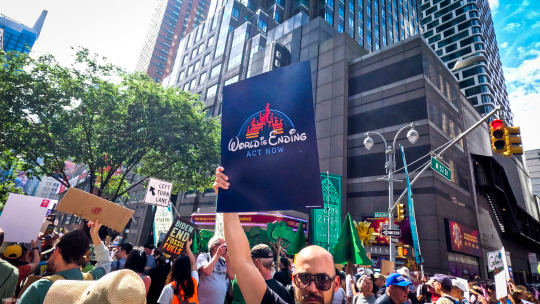
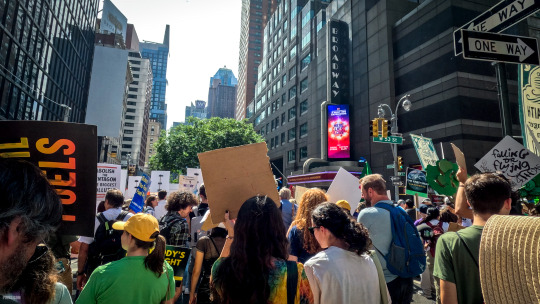
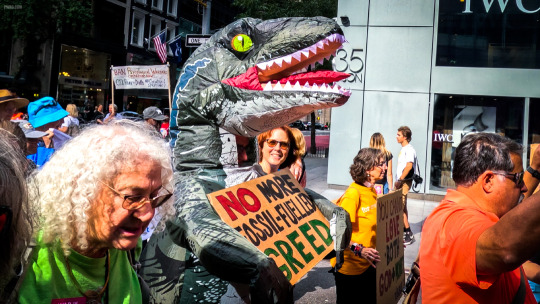
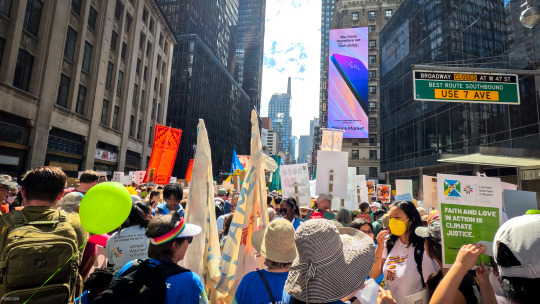
Climate Change March & Rally in New York City, September 17th, 2023.
#nyc#original photography#new york city#new york#photographers on tumblr#climate change#climate crisis#climate emergency#climate action#climate protest#global warming#fossil fuels#environment#protest#end fossil fuels#climate and environment#the lorax#lorax
2K notes
·
View notes
Text
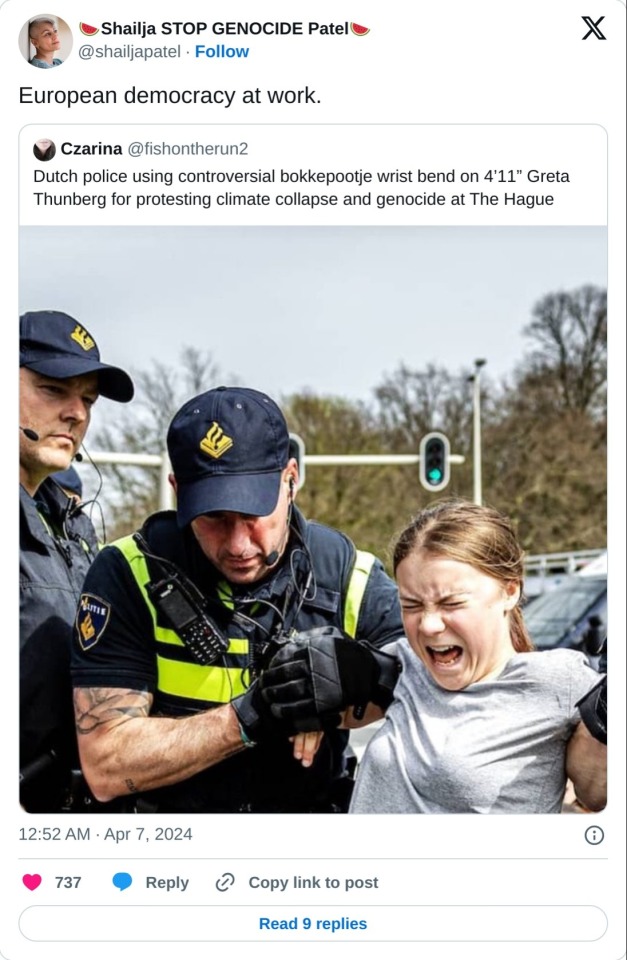
"No climate justice on occupied land"
#feminist#social justice#free palestine#settler violence#settler colonialism#genocide#climate justice#climate action#climate crisis#climate change#greta thunberg#europe#politics#the hague#netherlands#global news
39K notes
·
View notes
Text
Support Maui, Hawai'i Residents During the Lahaina Wildfire Crisis
A series of wildfires exacerbated by hurricane winds and climate change has destroyed homes, historical sites, and natural flora in Lahaina, Maui. Thousands have been displaced, and lives have been lost.
WWC's mod Ren has put together a page outlining resources for residents displaced and affected by the wildfires, and for those who wish to support them during this crisis.
Please share this resource and consider donating, especially if you are not local to Hawai'i and have visited or are considering visiting the islands.
Find a list of orgs to donate to HERE
Our hearts are with Maui residents during this tremendous loss.
-Writing With Color
#hawaii#maui fires#lahaina fire#disaster relief#climate crisis#donate#signal boost#climate action#mutual aid#aloha aina
3K notes
·
View notes
Text
youtube
Watch the American Climate Leadership Awards 2024 now: https://youtu.be/bWiW4Rp8vF0?feature=shared
The American Climate Leadership Awards 2024 broadcast recording is now available on ecoAmerica's YouTube channel for viewers to be inspired by active climate leaders. Watch to find out which finalist received the $50,000 grand prize! Hosted by Vanessa Hauc and featuring Bill McKibben and Katharine Hayhoe!
#ACLA24#ACLA24Leaders#youtube#youtube video#climate leaders#climate solutions#climate action#climate and environment#climate#climate change#climate and health#climate blog#climate justice#climate news#weather and climate#environmental news#environment#environmental awareness#environment and health#environmental#environmental issues#environmental justice#environment protection#environmental health#Youtube
12K notes
·
View notes